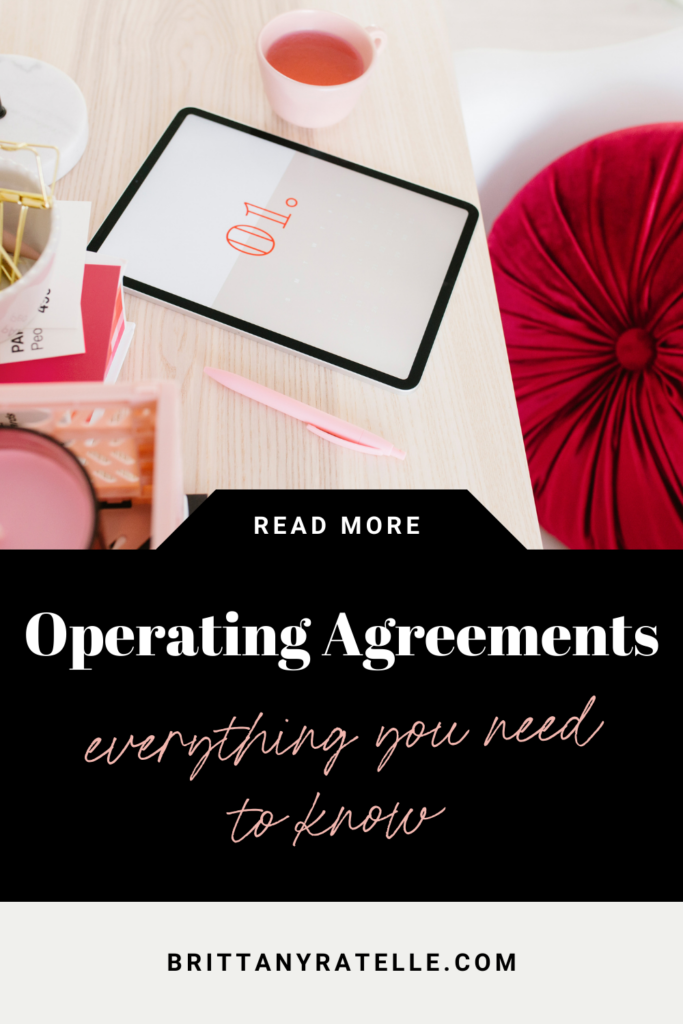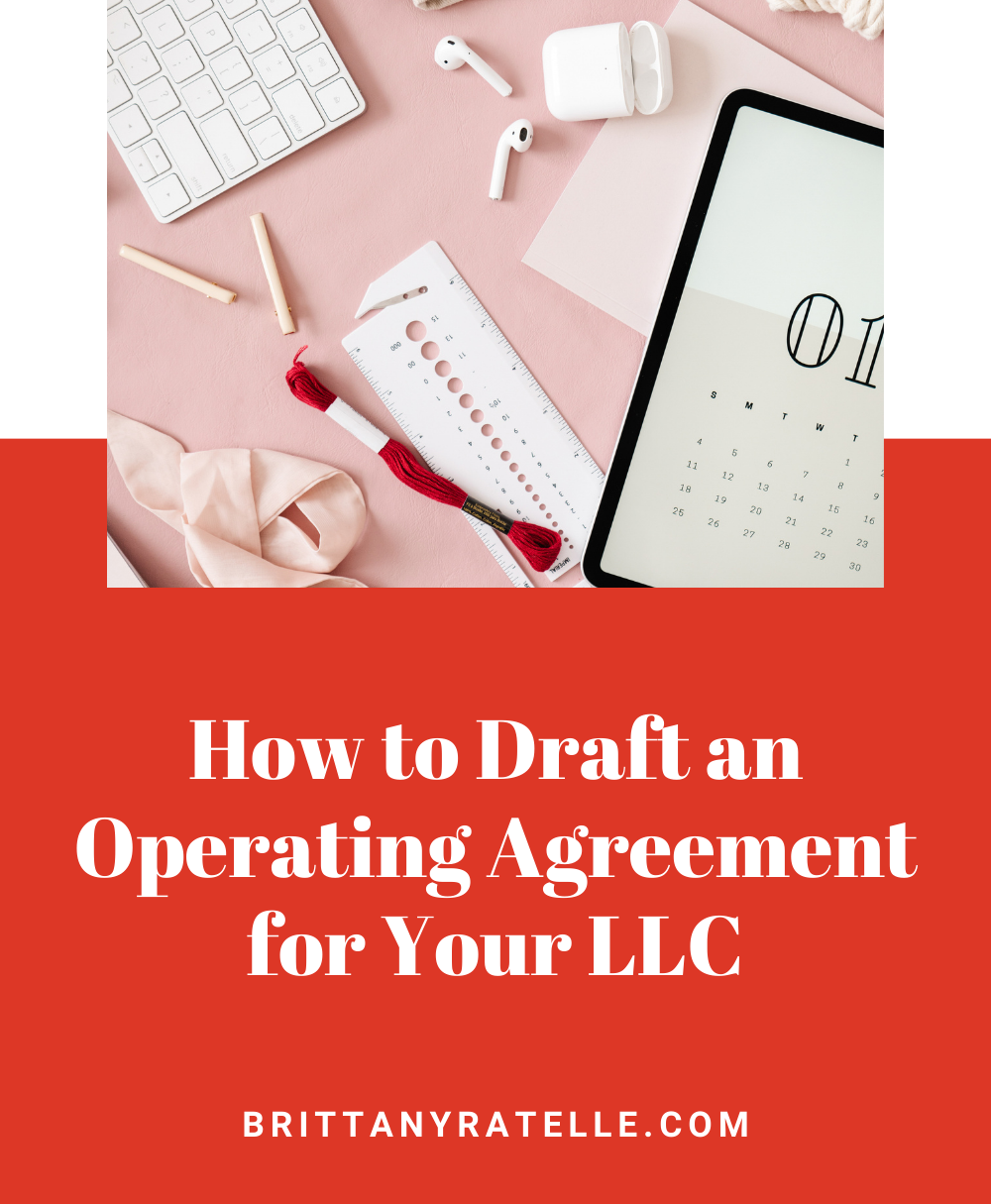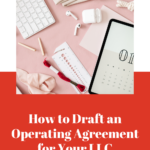How to Draft an Operating Agreement
Are you looking to create an LLC operating agreement? What exactly is an operating agreement and how do you know if your LLC needs one? These are all questions I am going to answer in this post! I’ve seen some mistakes made by people in the past on what they do and do not include in their operating agreements, so make sure to read through to get my top 6 recommendations on how to draft an operating agreement.
Operating agreements can be confusing, especially when you are trying to create one for your own business for the first time. If you’re new to owning a business and looking to draft an operating agreement, this post will tell you exactly what you need to know. These are my top 6 recommendations on how to draft an operating agreement for your LLC!
Disclaimer
What kind of attorney would I be if this didn’t have a disclaimer? I’m a licensed attorney and I practice in Utah and Idaho. I am not your attorney. This is not official legal advice. If you have any questions, please consult with a legal professional in your jurisdiction.
How to Draft an Operating Agreement

Operating Agreement Recommendation #1: Understand that an operating agreement is the internal rules for running your business.
One of the most important things you want to make sure your LLC does is in fact limit your liability. Your LLC acts as a fence that separates your business money and assets from your personal money and assets. The whole purpose of an LLC is to protect you if something goes wrong with your business.
With that being said, you want to properly set up your LLC from the very beginning. And you do this by establishing documentation that ensures every party follows through with what they are agreeing to.
When writing your operating agreement, the first thing to decide is if it will be member-managed or manager-managed. A member-managed business is recommended if it’s just you in your business. You are the member making all of the decisions for your business. However, if there are multiple members in your business and you want to control who has the power to make decisions for it then you may want to sign up your LLC as a manager-managed business.
I recommend setting this up when you register your LLC and outlining your expectations of the member or manager-managed you chose in your operating agreement. It will help give your business a strong foundation and avoid so many hiccups down the road as you continue to grow your business.
Operating Agreement Recommendation #2: Be clear about distributions in your business.
Your distributions are all about the money in your business. This is where you decide who will get distributions from the company and how much they are going to get. Instead of including these details in the operating agreement, I recommend writing out in your operating agreement that each member or manager of your business will agree in writing if and when they want to take money out of the business and actually take that profit distribution.
Right now, there could be all kinds of reasons why you don’t want to take money out of your business. Honor that and don’t box yourself into having to give out a certain amount of distributions at certain times. Keep it open and flexible as your business will go through different cycles. This will make it so it can continue to grow steadily over time.
Operating Agreement Recommendation #3: Leave out any capital contribution language in the operating agreement.
Operating agreements tend to have some type of capital contribution language in them. Having this in your operating agreement allows members to take out capital contributions and a right to return the capital to the business. In theory, this sounds like a good idea but there could be lots of reasons why you don’t actually want this to be the case.
For example, you could be facing litigation and you actually don’t want that money to come out and want it to stay in the business. Or, someone in your business could be going through a divorce and you want to keep that capital in the business. Another good reason would be for tax purposes, you don’t want to have a right to your business money but only your business.
Regarding the capital contribution language, I recommend working with a well-equipped certified public accountant or tax law strategist. They will make sure you are taking advantage of all of the opportunities to minimize your tax burden.
Operating Agreement Recommendation #4: Include intellectual property language.
This is a HUGE one to include in your operating agreement! This is especially important if your business falls under the category of thought leader, creator, personal brand, or anything similar to that. Having this type of business means that your intellectual property is the biggest asset you have!
Your operating agreement should clearly state that your intellectual property stays with the business and will not move from it. This ensures that if a member of your business leaves they cannot take your intellectual property with them.

Operating Agreement Recommendation #5: Set spending limits.
Make it really clear in the operating agreement on who is allowed to spend what. I recommend including a dollar amount on how much can be spent by each member of your business. That way you can take legal action if there is someone in your business spending tons of business money. It’s fine if they are spending money under your approval to benefit the business as a whole. However, it’s not OK if they are only enhancing their personal work performance that the rest of you didn’t agree on.
Operating Agreement Recommendation #6: Set up transfer restrictions.
Including transfer restrictions in your operating agreement will protect the members of your business. This will keep them from having anyone just hop in and take over someone’s interest in the company. For example, if you have one of your members leave the business, they will walk through a specific exit plan. This plan will keep your business protected. Rather than this member selling their interest or shares to a random person, the shares will go back into the business. Then you as the owner can decide who the new person will be that you give your shares to.
How to Draft an Operating Agreement
I hope these 6 recommendations on how to draft an operating agreement were helpful for you and your LLC! The bottom line is that this operating agreement is one of the most critical things you can do for yourself. And even for your future self so you can avoid having an ugly “business divorce.”
This operating agreement sets you up with clear boundaries and conversations right from the beginning. This is what a brand-new business needs in order to thrive on its new foundation and last through all the ups and downs it will face over the years. If you’re sold on this important document then click HERE to grab one that I’ve created for you already! And make sure to follow me on Instagram @brittanyratelle to keep getting the best tips and tricks on making your business legally legit.

READY TO GET YOUR BUSINESS LEGALLY LEGIT?
Download my free legally legit workbook HERE – your free guide to getting your business set up, protected, and ready for growth. When you sign up you’ll also get access to my newsletter with tips and tricks for YOUR growing creative business.
LIKE TO LISTEN AND LEARN?
Listen and subscribe to Creative Counsel podcast on iTunes, Overcast, Stitcher, Spotify & iHeartRadio.
LET’S CONNECT
Are you interested in getting a copyright or trademark? Book a brand-protected strategy session with Brittany HERE and get a game plan together for your brand and content.
Interested in working with Brittany for one-on-one legal services? Sign up for a 15-min phone consult at brittanyratelle.com/services.
Want an attorney-drafted, industry-tested legal template for your business? Take a free quiz and find out exactly what you need for your creative business at creativecontracts.co.
Or, browse through my quick tips and tricks by connecting on Instagram.







Be the first to comment